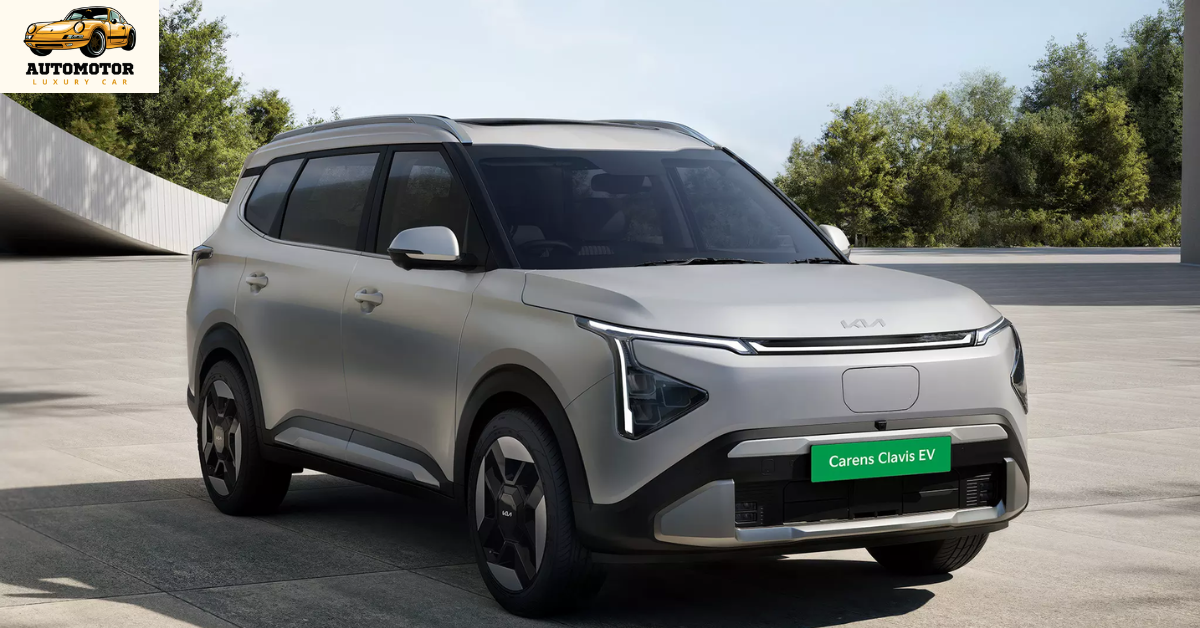On July 15, 2025, Kia India unveiled the Carens Clavis EV, marking its debut in the competitive, mass-market electric vehicle segment—and making it India’s first domestically-built, electric three-row MPV. Priced from ₹17.99 lakh (ex-showroom), this EV aims to disrupt the landscape entirely.
🚘 Design & Aesthetic Update
Built upon the recently introduced Carens Clavis ICE variant, the EV retains its signature crossover-MPV silhouette. However, Kia injected a few EV-specific tweaks for better aerodynamics and usability:
- Sealed front grille with an integrated charging flap and active air flaps that open/close automatically.
- LED “ice-cube” fog lamps, silver-highlighted bumper trim, and new aero-optimized 17″ alloys.
- A handy 25-litre front trunk (frunk)—a space-saving bonus not found in ICE versions.
Overall, it projects a modern, eco-conscious vibe while preserving the Carens’ familiar family-friendly lines.
🔋 Powertrain, Range & Performance
Kia offers two powertrain choices:
| Battery Type | Capacity | Power | Torque | ARAI Range |
|---|---|---|---|---|
| Standard | 42 kWh | 135 PS (≈ 132 bhp) | 255 Nm | 404 km |
| Extended | 51.4 kWh | 171 PS (≈ 169 bhp) | 255 Nm | 490 km |
- The larger battery propels the EV to 0–100 km/h in just 8.4 seconds.
- Regenerative braking includes i-Pedal, paddle shifters, and an intelligent auto mode.
- For charging: an 11 kW AC charger (4–4.75 hrs full charge) or a 100 kW DC fast charger providing 10–80 % battery in ~39 minutes.
This blend of performance and flexibility suits Indian driving—from city commutes to long road trips.
👨👩👧 Family-First Interior & Tech
Inside, the EV borrows heavily from its ICE sibling, featuring a premium, tech-rich cabin:
- Dual 12.3″ panoramic digital displays for infotainment and the driver.
- Panoramic sunroof, ventilated front seats, ambient lighting (64 colours), 8‑speaker Bose sound, wireless charging.
- V2L & V2V charging—turning the car into a power source for external devices.
- Cabin space is generous: 7 seats only; no 6-seat captain chair variant for the EV.
- Safety suite includes 6 airbags, ESC, ABS with EBD, stability control, 360° cameras, and Level 2 ADAS with ~20 features.
This elevates the Carens Clavis EV into a fully rounded family cruiser—comfortable, safe, and tech-forward.
🛡️ Kia’s Charging & After-Sales Ecosystem
Ahead of launch, Kia introduced a comprehensive EV ecosystem:
- K‑Charge via MyKia/Kia Connect app connects to 11,000+ chargers across India, in partnership with 18 operators.
- Assistance with home AC charger installations
- Over 250 EV-ready workshops and 100+ dealerships equipped with fast-charging.
- A strong battery warranty: 8 years or 1.6 lakh km.
This infrastructure addresses critical EV ownership pain points—charging access and dependable support.
💸 Trim Range & Pricing
Priced transparently and accessibly, the Carens Clavis EV comes in four variants:
- HTK+ (42 kWh) – ₹17.99 L
- HTX (42 kWh) – ₹20.49 L
- ER HTX (51.4 kWh) – ₹22.49 L
- ER HTX+ (51.4 kWh) – ₹24.49 L.
With bookings starting July 22, 2025, and deliveries following soon after, Kia is positioning this EV as a compelling alternative to traditional ICE MPVs and emerging electric rivals like the BYD eMax 7.
🧭 Target Audience & Indian EV Implications
The Carens Clavis EV is squarely targeted at Indian families seeking:
- Ample space and comfort for 6–7 occupants
- Advanced tech and premium feel, at an affordable price
- Emission-free driving with real-world range and practicality
- A robust support ecosystem reducing ‘range anxiety’
By combining these at a starting price under ₹18 lakh, Kia is challenging perceptions that electric family cars must be expensive. This could accelerate adoption among middle-class buyers who previously leaned toward diesel/hybrid MPVs.
🏁 Final Take
The Kia Carens Clavis EV arguably sets a new benchmark in India’s EV landscape. It delivers:
- A compelling value proposition: first made-in-India electric MPV with class-leading features and range.
- A balanced offering: from frunk storage to Level 2 ADAS, it’s a fully-featured family car—not a bare-bones EV.
- A future-ready ecosystem, ensuring ownership won’t feel like a leap in the dark.
